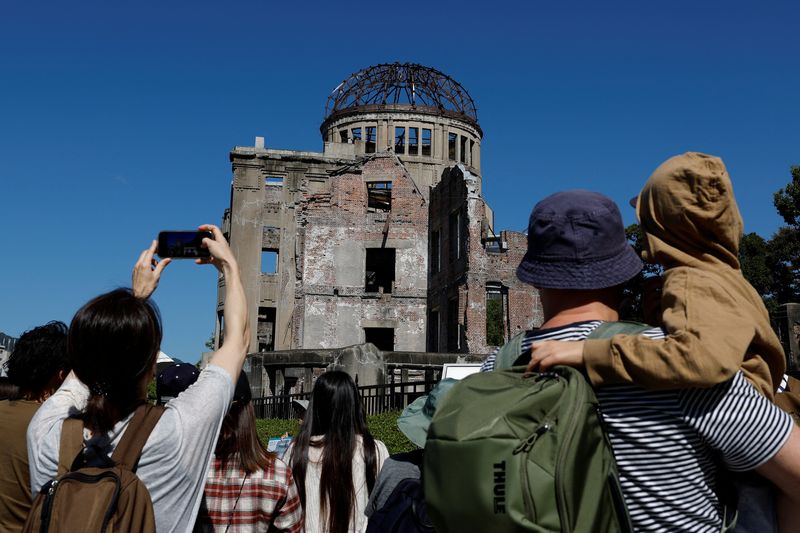By Daniel Leussink and Irene Wang
HIROSHIMA, Japan (Reuters) – Visitors to the memorial park for Hiroshima’s atomic bombing said they hoped Friday’s Nobel Peace Prize for Japan’s atomic bomb survivors would boost efforts for world peace and spur world leaders to visit the site.
The Norwegian Nobel Committee awarded the prize to the Nihon Hidankyo group, representing survivors of the 1945 U.S. atomic bombings of Hiroshima and Nagasaki, for its decades-long efforts to abolish nuclear weapons.
“As Japanese people, I believe we need to ensure that the same thing doesn’t happen again,” Ui Torisawa, a 21-year-old student who was visiting the Peace Memorial Park with her friend, told Reuters.
“Since Japan is the only country to have suffered atomic bombings, and because similar things could be repeated in other countries, I think Japan is probably in the best position to stop that.”
August next year will mark the 80th anniversary of the bombings. It is likely to draw focus on the legacy of its survivors, known as “hibakusha”, and could set off a renewed debate about nuclear weapons.
Yasuhiro Suzuki, who was visiting the Peace Memorial Park with his wife, son and daughter from Fukuoka prefecture in southwest Japan, called it “groundbreaking” that the group representing the atomic bomb survivors was awarded the Nobel Peace Price.
“Nuclear power is incredibly beneficial to the world, but we must be careful not to misuse it,” Suzuki said. “I hope this becomes an opportunity for people around the world to think about various aspects of this issue.”
Hiroshima’s peace park has long drawn not just Japanese visitors but also foreigners, including world leaders such as Barack Obama, who spoke at the site as U.S. president in 2016 and hugged a tearful hibakusha.
“I believe there are still many prime ministers and leaders in the world who could come (to Japan), and I hope they will make the effort to visit,” said Hiroshima resident Hirokazu Tanabe, who works as a driver and who came to the park to show around a friend.
Many Japanese feel the U.S. should apologise for the bombings, which killed hundreds of thousands and prompted Japan’s surrender days later. Japan has since relied on the U.S. for protection, renouncing the right to wage war and defining its military as only for self-defence.

Twenty-two-year-old student Ayane Takiguchi, who visited the park with Torisawa, said it was an honour the group representing atomic bomb victims was awarded the Nobel Peace Prize.
“I myself am studying education, and I’ve recently recognised the importance of achieving peace through education,” she said. “In that sense, I’m happy that this has such a big impact.”